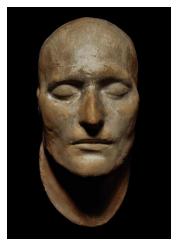Death of Napoleon Bonaparte

|
| Napoleon's Death Mask. |
Barry Edward O'Meara, an Irishman born in Newtown on Sea (now Blackrock), was the senior Navy surgeon on HMS Bellerophron who accompanied Napoleon into exile on St Helena and became Napoleon's personal physician in July 1815. O'Meara was expelled from Longwood house in July 1818 after the Governor, Sir Hudson Lowe, refused to accept his diagnosis concerning Napoleon's declining state of health, believing that O’Meara was being manipulated by the Emperor in an attempt to end his exile by being moved off the island to a more ‘healthy’ location. He was replaced by a Corsican surgeon, François Carlo Antommarchi who, amongst others irregularly attended Napoleon Bonaparte until the former Emperor's death at Longwood House, St Helena on 5 May 1821 at the age of 51.
Samples of Napoleon’s hair, taken when he was alive, revealed in tests in 1961 that they contained high levels of arsenic. It is now believed that there were high levels of arsenic in most people living in that period and that the arsenic was not the cause of his death, rumoured to have been administered by his British captors in an attempt to poison him. In 2021, it was suggested by a professor of biomedical science that essential oils in his eau de cologne contributed to his deteriorating health and eventual death on St Helena where his post-mortem concluded that he had died of gastric cancer. Bonaparte believed towards the end of his life that he was suffering from the same ailment that had killed his father Carlo in 1785; there was a family history of gastric cancer.
It was said that Napoleon used some 60 bottles of eau de cologne a month from the early 1790s. He would regularly cover his body with cologne after washing or bathing. This included pouring it over his head and sometimes drinking diluted cologne. The professor claims that this would have exposed Napoleon to exceptional levels of these essential oils that included citrus fruits and lavender. The ethanol in the cologne would have encouraged the absorption of these oils and as ‘endocrine disruptors’ would likely have affected his hormone system. This may also account for witness descriptions of Napoleon’s enlarged breasts and hairless skin in addition to his unhealthy weight gain. It may be that the vanity of his cologne addiction contributed to the causes of his cancer.





